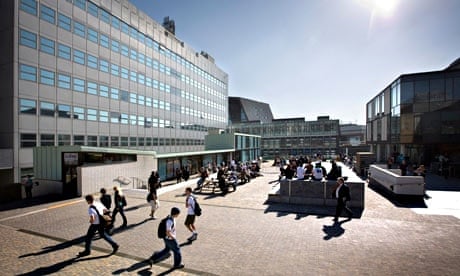Plymouth University has come under fire for spending £95,000 on seven designer chairs for its graduation ceremonies.
The chairs have been commissioned from the designer John Makepeace, and will be used in both its graduation ceremonies and other public university events. A statement issued by the university has corrected initial reports that said the chairs would cost £150,000.
Philippa Davey, a regional support official for the University and College Union (UCU), said that staff at the university were “angry and disappointed” at the decision to spend money on graduation chairs: “We’ve had a number of jobs lost in the university through voluntary redundancy in order to save money, and feel that all that hard work where we were looking at saving money and cutting down costs has in a way been wasted by commissioning £95,000 worth of chairs.”
Davey also expressed disappointment at the university’s “lack of openness and transparency” about the cost of the commission, and said that earlier in the year, when union representatives raised the issue at meetings of the Joint Consultative Committee (JCC), their questions were not answered.
Mike Sheaff, associate professor in sociology at Plymouth University, said: “Staff have expressed concern and disquiet at the timing as it has coincided with staff redundancies, which have just been justified on a rationale that savings are required. The university has not provided any rationale for this decision, and in my opinion, made the situation more difficult by a lack of transparency. There have been rumours circulating for several months and personally I’m pleased that information is being disclosed now.”
The decision to commission the chairs was made in March 2013 by the then vice-chancellor Wendy Purcell. In June 2014, she decided she wanted no further involvement with the project.
A month later, in July 2014, Purcell was suspended. Since then, the university has been led by deputy vice-chancellor David Coslett. No reason has been given by the university for Purcell’s suspension, though there has been speculation that the lack of financial restraint might be a factor.
This is not the first time Plymouth has been criticised for extravagance. In 2013 the university spent an extra £1.2m on consultancy fees.
Davey said that it was up to the university to decide whether Purcell’s decision to commission the chairs was a breach of university processes, but that the union would “question the wisdom of allowing one person to make a decision of spending £95,000 at a time when we need to save money”.
The university said that it hoped to secure funding for the chairs through donations and sponsorship, but was unable to say who these might be.
A statement issued by the university today expanded on the reasons for commissioning the chairs, saying that the university’s graduation week brought in £700,000 of additional tourism income into the city economy. It went on: ”Ultimately, this is not about chairs but a collection of contemporary design pieces by one of the world’s leading furniture designers,” adding that a major museum was interested in adding the chairs to its contemporary design collection.
Responding to the university’s claim that the chairs would bring in tourist funding, Davey said: “I’d be pushed to find anybody who says they come to Plymouth to look at a graduation chair.”
Join the higher education network for more comment, analysis and job opportunities, direct to your inbox. Follow us on Twitter @gdnhighered.

Comments (…)
Sign in or create your Guardian account to join the discussion